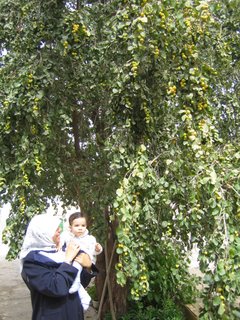


I'm making a point of recording some of my thoughts on the nice things I find in Iraq and Iraqi society, so that it's not all pessimistic and negative.
One of the beautiful things about this country is that almost any house with a 'backyard' has at least one fruit tree in it; even if the owners aren't very well off. There's just an abundance of 'giving' trees here, mashaAllah. Some of the more prevalent fruit trees that I have seen are naranj trees; a type of citrus fruit, looks like an orange but is much more sour/bitter (used as a lemon for flavoring, mostly). Many gardens also have berry trees, palm trees, etc.
This is a picture of my husband's aunt's garden. There's actually nothing else in the garden (they're in the process of redoing it) but this nabq tree. Its a gorgeous tree, huge and full of fruit mashaAllah.

7 comments:
Ooooh the nabug tree! I miss it so much...my grandfather had a huge tree in his garden and I'd fill up my pockets every week when we'd visit.
chima nabug and masgoof tikka and gus and to hell with the rest
The question is: What do you call Nabug in english or botanic scientific language?
I have not had it for decades.It is not available in Australia.
ceder tree and cedar tree which we use for logging to build houses in the U S, I have one big one just like the picture in Sandiego and I gave most of it away Tim Mahmud eagleaviation@att.net
The naranj is sour orange or Seville orange and nabug is Spina-Christi fruit.
In Iraq, the genus Ziziphus includes three species. 1: Ziziphus spina-christi, locally called nabug or spina-christi fruit. It is planted in backyards, parks, and many mosques. 2: Ziziphus jujuba, locally called innab or jujube. It is planted on a small scale in orchards in Baghdad and Basrah. 3: Ziziphus numularia, locally called sidir and it is found growing naturally in the desert of Central Iraq.
It's lovely to read this! Thank you for translating the words naranj and nabug to English.
Post a Comment